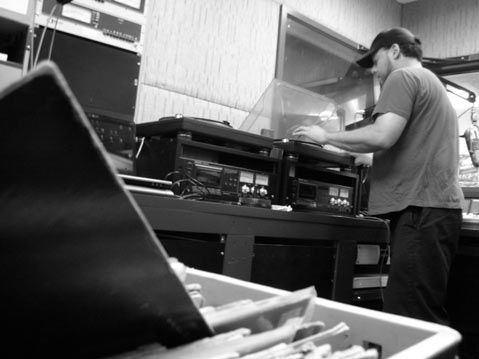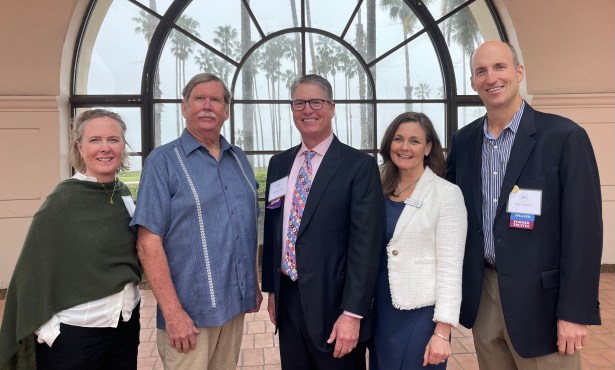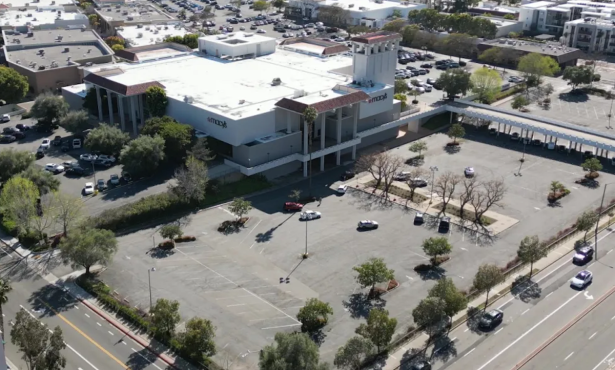Hip-Hop by Hand
George Duarte is XTEK OVERLOAD, master of Chronometricz

Having sat in the studio for Chronometricz, I now believe all the show’s other listeners should do the same. When they tune in Friday nights between 8 and 10 p.m., they hear sets blending Latin, electro, old-school rap, late-80s dance, and even rarities from the 70s. They hear words, they hear music, and they hear the mixture of both. But they don’t see how much manpower goes into it.
They don’t see the KCSB studio transformed into something like a combination DJ booth, production room, record library, backstage lounge, and live stage. They don’t see what’s most impressive: that the Chronometricz crew somehow does it all with KCSB’s built-in equipment.
Host and DJ George Duarte, also known as XTEK OVERLOAD, has led just the kind of life and career to acquire the skills to pull this off. While Duarte sets up before each show, rapper Chui Malik mans the hand-truck, wheeling seven crates full of vinyl into the control room. “I’ve been on a kick,” Duarte said. “I’ve been trying six crates, seven crates, eight crates, but I’ve found that seven’s the magic number.” And if you do happen to sit in on the show, don’t even look at his crates funny. “These crates took 15 years to get in the perfect order. I fly off the handle of you move them.”
Duarte’s experience as a DJ and producer stretches back even further than that. “I got my first turntables at 16. That was 1986. Then came the drum machines, the little Yamaha samplers—no sequencers—and a four-track recorder. Everything was finger-triggered. That’s why I have this ability.” That ability, in use constantly throughout the show’s two hours, was his almost supernatural way of manipulating imperfect gear to produce exactly the sounds he wanted, exactly when he needed them. He demonstrated by playing a pretty respectable beat using only one of the studio CD players’ cue buttons. “I’m trying to change the tempo, but the turntable’s pitch control doesn’t go far enough,” he later said, pressing his thumb directly onto a spinning disc. “I have to do it by hand. Took me years to learn this.”
DJing alongside then-prominent KCSB personalities Sam Mack and Jeff Peterson, Duarte made his debut on the station in 1988, on the show Friday Night Mix. The next year, Duarte and several other DJs had a four-hour time slot on the commercial station Y-97, which they paid for themselves, “like it was one big ad.” Taking a break from the airwaves in the 1990s, Duarte “kept producing, sampling, and being creative” in the 805, focusing on his work with hip-hop groups The Limbz and Lil’ Indianz, occasionally spinning with the well-known Santa Barbara DJ Frank Ramirez. “In 2007, some guy who worked at KCSB came up to me and said, ‘You’ve got to come back!’ So I officially restarted here in 2007.”
Now that he’s back and established on KCSB, doing a Friday-night mix of his very own, he’s regularly joined by other performers. Malik, the most regular Chronometricz attendee, fills the co-host role whenever he can make it, not just rapping but announcing on the air as well. “It’s Friday!” he informed the show’s listenership. “Kick start your night before you go out and get twisted.” Malik’s and Duarte’s working relationship goes back to the 1990s.
“He was my first producer,” Malik said. “We were in the Lil’ Indianz, a group of Indian-looking Mexican guys. We’d sing and talk about Goleta. We’re still a legend in Goleta. He’s always produced good music. Kids still ask him for copies of all the old stuff.”
Malik and the other rappers who drop in on Chronometricz are usually good for an on-air performance. “We’ll perform music and lyrics that we’ve just written, all live,” Duarte said. “People call up and ask what we were playing—they don’t even realize it was live!” That seems to be the goal on this show: Do as much as possible live, in-studio, by hand—but make it sound polished enough to have been pre-produced. That’s not to say that Duarte doesn’t enjoy an improvisational challenge, especially those involving unlikely jumps from style to style. “I like to transition between genres smoothly, playing two or three songs per genre,” he said. “I try to make it so you can’t even tell the difference between them, even if we’re going from Janet Jackson into drum-and-bass.”
This night’s sets were heavy on old favorites like Rick James, Grandmaster Flash, Bell & James, Prince, and even Duarte’s own remix of Rob Base and DJ E-Z Rock’s “It Takes Two.” Duarte explained, “Sometimes there’s more hip-hop, and sometimes there’s way more dance, but I’ll do all kinds of sets. One time I did a set I called ‘From Jamaica to Japan.’ They’re both islands, and they’ve both got thick accents. They rap in English, but it’s their own brand of English. You put them together, and you get a third thing. It’s like you’re synthesizing.” But his love of unlikely combinations comes second to his love of the music of 1989, which he considers a sonic annus mirabilis. “The cool thing about 1989 was that hip-hop tried to get back to what it really was—disco rap. Stuff from 1979 was so dance-oriented; 1989 was an echo.”
As he darts back and forth in a sort of triangle between his crates, the turntables, and the mixing board—far from an ergonomically sound arrangement—Duarte exudes a peculiar combination of focus and chill. “If I make mistakes, I’m not afraid to take the criticism,” he said. “I can say, ‘Oh, that wasn’t right.’ At first, I was so inhibited on the radio. Now I’m more liberated.” If any station can liberate you, this would seem to be the one. Or, as Malik put it, “You know how we do on KCSB.”
4•1•1
Chronometricz airs Fridays from 8 to 10 p.m. on KCSB, 91.9 FM.



